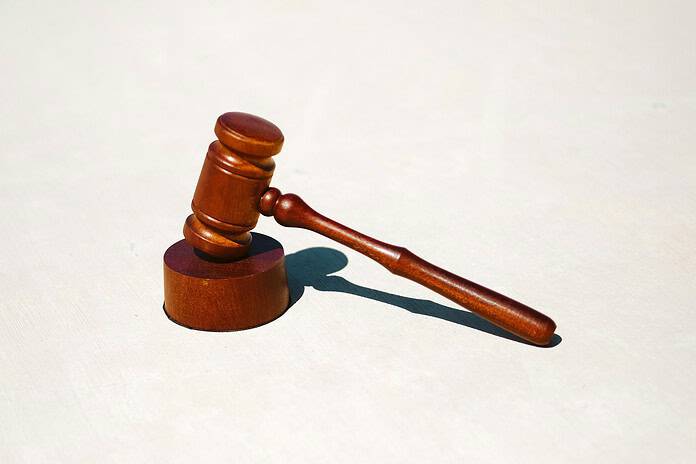An ordinance designed to prevent littering yards with unsolicited materials such as newspapers and fliers came before the Board of County Commissioners during the Dec. 17 meeting.
The proposed ordinance is officially meant to enact time, place and manner restrictions applicable to distribution of unsolicited materials. Specifically, the discussion focused on the marketing strategy of newspapers being thrown into the yards of non-subscribers, a method meant to push the product but often leads to newspapers being left there by residents.
If the BOCC were to pass the ordinance, any unsolicited materials could still be distributed though only from 9 a.m. to 6 p.m. The vote on the ordinance was delayed until the first BOCC meeting in January.
“The U.S. Supreme Court has made it very clear, and I agree and I believe we all agree; matter of fact I know we all agree that people have First Amendment rights and those rights should be protected at all cost,” said Commissioner Jerry Campbell, who originally requested the proposed ordinance. “So that’s not what this is about. This is about the unsolicited littering of our county.
“… You drive around; I did it yesterday. This was five days past the distribution of the newspaper into the driveways, and/or yards and/or streets. The majority of the homes have that same newspaper in their yards, in the street or in the driveway, which then becomes a nuisance not only to the neighborhoods and to the particular property owners but also potentially harmful to the county infrastructure moving forward.”
First Amendment issues immediately came to the forefront, with Commissioners Ryan Amsler and Steve Champion voicing their concerns.
“In reflecting on this and this proposal, I just don’t personally feel it’s my job as a commissioner to tread so closely to the freedom of speech that individuals and newspapers and businesses have to reach other members of their community,” Amsler said. “I think we’re much better suited to be making ordinances that are pro-liberty or pro-business, or repealing regulations and ordinances that can help our community thrive.”
Champion pointed out it could appear hypocritical for elected officials to pass such an ordinance given that political materials would also fall under the items it would govern.
Beyond newspapers, the ordinance would seek to limit handbills, advertisements or other paper materials thrown on lawns, driveways, rights of way or porches. The reason given is these materials are blown around and can cause unsightly littering, the clogging of storm drains, damage to waterways and decrease the aesthetic quality of neighborhoods.
“What I’ve really got a problem with is these people throwing garbage in my yard and on my driveway,” Commissioner John Allocco said. “And by garbage, I mean unsolicited newspapers and ads and things like that, sticking them on my mailbox with a piece of tape, and it just blows around and causes a problem.
“Now when we get into an area like Spring Hill where we have now infrastructure, and we have our sewers and stuff like that, and they’re supposed to be able to take water during a storm and they’re filling up with these newspapers that swell when they get wet and they become problems and cause clogging of our infrastructure, now the county is having to pay for that, as well.”
Chairperson Brian Hawkins apologized for not seeing the ordinance in the email sent out to commissioners ahead of the meeting and was unable to properly review it.
“At this point, I don’t think I could support it,” Hawkins said. “I would like to read it a little bit further because some things in there that I would like to redline and recirculate if necessary.”
The Board agreed to delay a vote until Hawkins had time to recommend those changes. One particular alteration will be providing a 60-day window from the time of the ordinance going into effect to allow businesses time to adapt.
It remains to be seen whether the extra time will create enough votes for the ordinance to pass.
“We’re supposed to be the party of less regulation, less government,” Champion said. “If it impedes someone’s Constitutional right, I don’t care if 1,000 pieces of trash are in your yard. It can’t violate one person’s right. I won’t be supporting limiting free speech.”
According to a 1980 research paper by Rick D. Pullen, Associate Professor Department of Communications California State University, Fullerton, presented at the Annual Meeting of the Association for Education in Journalism, “The U.S. Supreme Court has ruled that only ‘reasonable’ restrictions that are narrowly drawn can be enforced in order to protect the privacy, safety, and welfare of the individual. Apparently city government interprets ‘reasonable’ restrictions in an overbroad manner as evidenced by current ordinances. Yet, courts have not supported such overbroad ordinances and have said that provisions should be narrowly drawn regulating time, place, and manner without regard to content. In addition, courts have not been sympathetic with ordinances requiring prior consent but have supported those requiring distributors to stop distribution to those residents who object to material circulated.”
The Florida Press Association Legal Hotline stated that private landowners can ask for non-delivery “and may be able to sue (unlikely) for damages if landowner can show there is a litter or other ordinance violation.”
On the agenda for January 14 is an ordinance prohibiting the abandonment of newspaper vending machines.
The Hernando Sun does not distribute free newspapers to driveways and yards. Additionally, The Hernando Sun regularly maintains ten vending machines throughout Hernando County.

